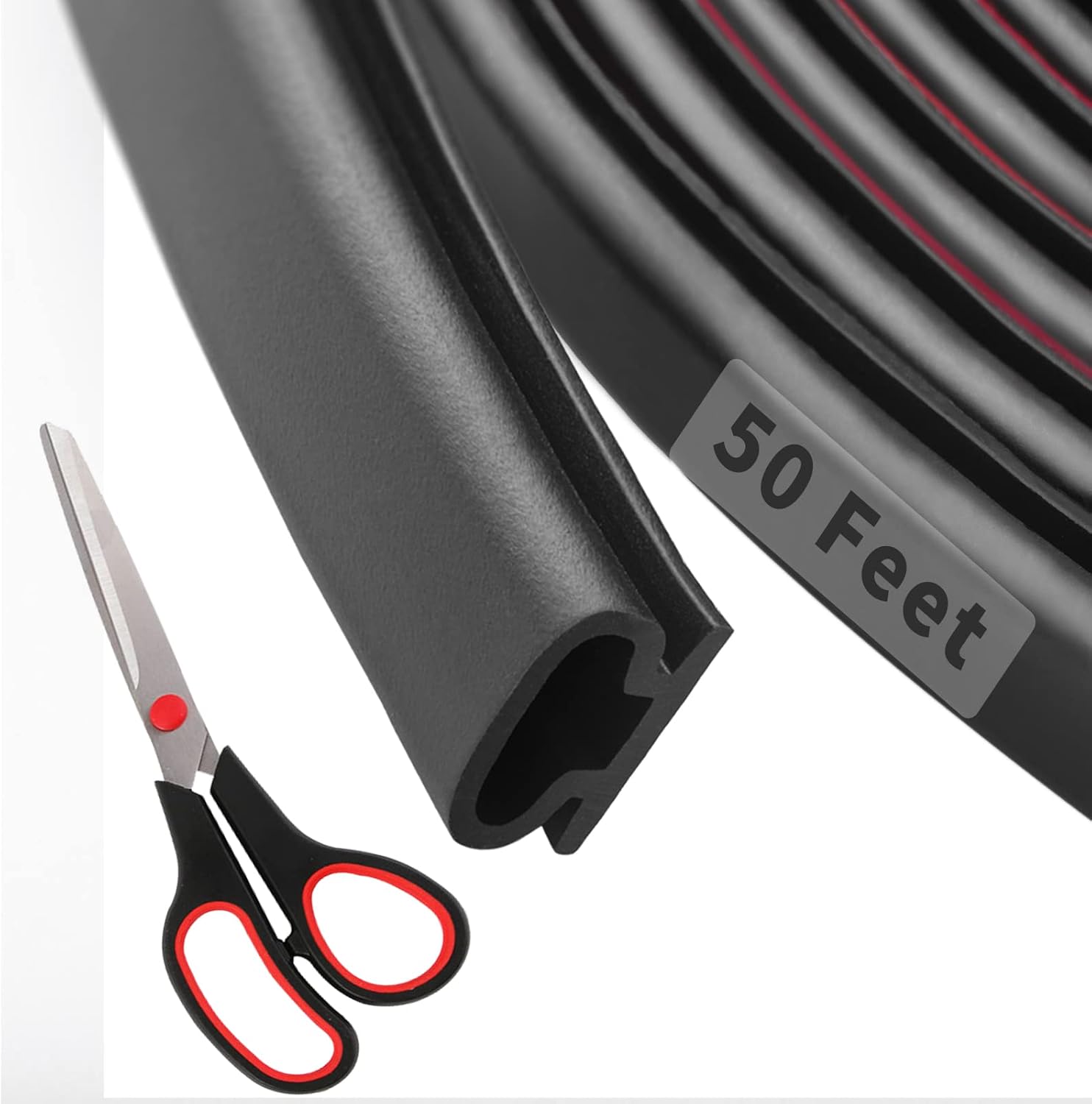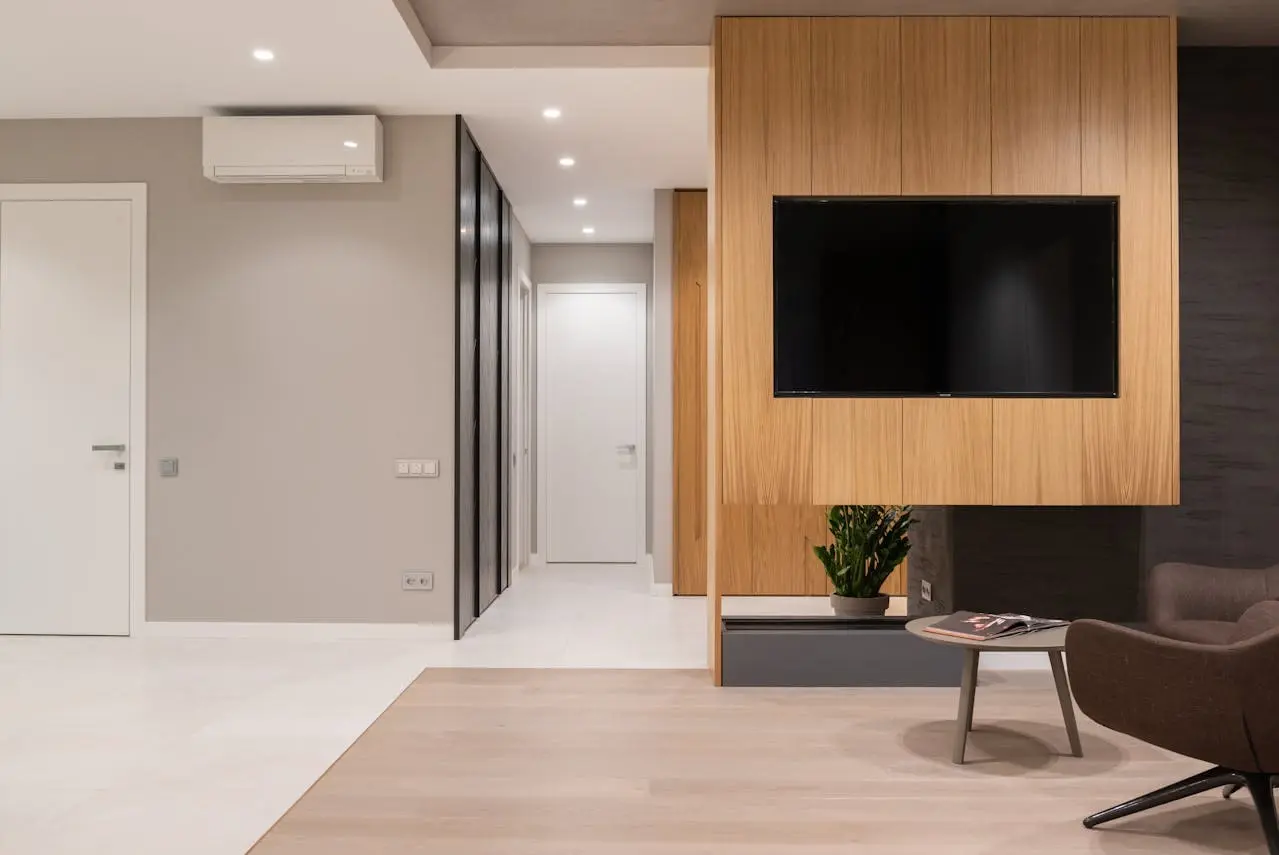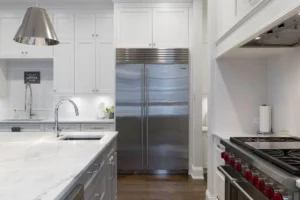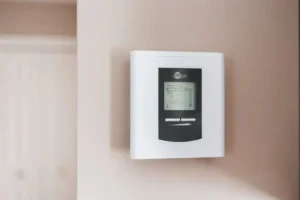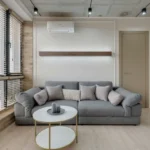Now Reading: What Air Conditioner Size Do I Need?
- 01
What Air Conditioner Size Do I Need?
- Home
- Home Appliances
- What Air Conditioner Size Do I Need?
What Air Conditioner Size Do I Need?
![]() Anne MaddisonHome Appliances, Climate ControlJuly 27, 2025221 Views
Anne MaddisonHome Appliances, Climate ControlJuly 27, 2025221 Views

Buying an air conditioner is a big investment. Let’s be real—they’re not cheap! So if you’re going to spend that much money, you want to make sure you’re getting the right one.
But here’s something most people don’t think about: the size of the air conditioner matters just as much as the brand or features. And no, we’re not talking about how big it looks on the outside. We’re talking about how much power it has to cool your space.
If your air conditioner is too small for the room, it will have a hard time keeping you cool. It will keep running non-stop and still won’t feel cold enough.On the other hand, if your AC is too powerful, it might cool the room too fast and shut off before it removes enough humidity. As a result, the air may feel unpleasant and humid. Plus, both of these problems can make your electricity bill go up and wear out the AC faster.
The good news? You don’t need to guess. I’ll walk you through how to choose the right size air conditioner for your space. I’ll keep it simple and explain everything in a way that makes sense—even if you’re not a tech expert.
Common Terms When Shopping for AC
Before we go any further, let’s talk about three common terms you’ll see when shopping for an air conditioner: BTU, tons, and HP. These might sound a little technical, but don’t worry, we’ll break them down in a way that’s easy to understand.
What is BTU?
BTU stands for British Thermal Unit. It serves as a gauge for an air conditioner’s cooling capacity. The AC can cool more air if its BTU value is higher.
Think of BTU like the strength of the AC.
More BTUs = more power to cool a bigger space.
Use the chart below to find out how many BTUs you’ll need:
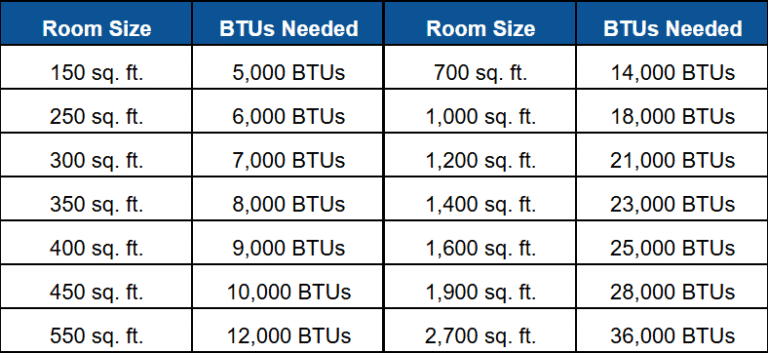
Source: Reliable Energy Management Inc
What is a Ton in Air Conditioning?
In AC talk, 1 ton = 12,000 BTUs.
So when someone says an AC is “2 tons,” they mean it has 24,000 BTUs of cooling power.
Tons are usually used when talking about central air systems or cooling a whole house, not just a room.
Example:
- A 1.5-ton AC = 18,000 BTUs
- A 3-ton AC = 36,000 BTUs
What is HP (Horsepower)?
Some air conditioners, especially in parts of Asia, use horsepower (HP) instead of BTU or tons. It measures the motor power of the AC, not just cooling strength.
Here’s a rough comparison:
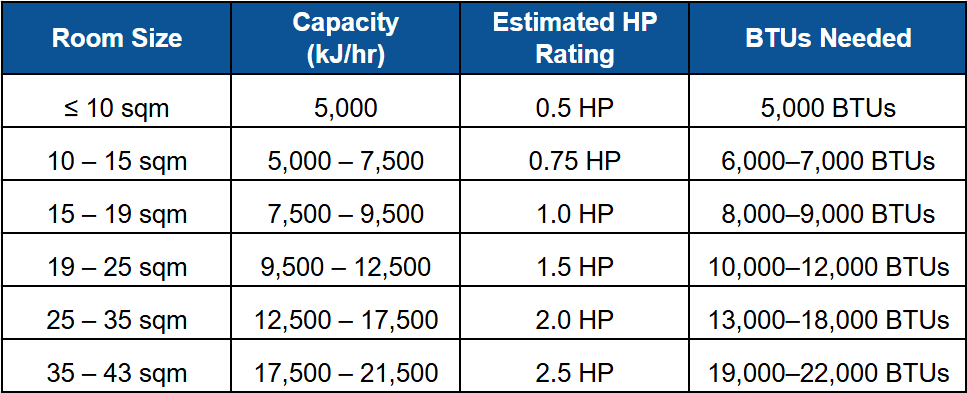
Source: AllHome
How to Calculate the Proper AC Size for Your Room or House
Now that you know the common terms when buying an air conditioner, let’s get into the most important part: how to figure out the right air conditioner size for your room.
It’s easier than you think! You just need to know two main things:
- The size of your room (in square feet)
- The cooling power needed (measured in BTUs)
Here’s how to do it step-by-step:
Step 1: Measure Your Room
Find the length and width of your room using a measuring tool like tape measure. Multiply them together to get the area.
Example:
If your room is 15 feet long and 10 feet wide:
15 ft × 10 ft = 150 sq. ft.
This means your room is 150 square feet.
Step 2: Multiply by 20
A simple rule is to multiply your room size by 20 BTUs. That gives you a rough idea of how much cooling power you’ll need.
Example:
150 sq ft × 20 = 3,000 BTUs
This means you’ll need an AC with at least 3,000 BTUs for a 150 square feet room.
Here’s the catch—most home air conditioners start at 5,000 BTUs, which means you’ll likely need that size even for small rooms. It’s okay if it seems slightly more than the math shows, this gives a little extra power to help on hot days or when there are extra heat sources.
But wait—that’s just a basic estimate. Some things can make your room hotter and change how powerful your AC should be.
Other Factors to Consider When Choosing AC Size
Knowing the square footage is important, but there are other factors that also affect the right AC size. The actual amount of cooling electricity required can vary depending on several room conditions. Other crucial considerations are as follows:
1. Sunlight Exposure
If your room gets a lot of direct sunlight, especially in the afternoon, it will naturally get hotter. In this situation, increase your calculation by around 10% in BTUs.
For example, if your room is 400 square feet, the basic calculation (room area in square feet × 20) gives you 8,000 BTUs, which is the minimum size needed to cool the room under normal conditions. But if the room gets strong sunlight, you may want to go for around 8,800 BTUs instead. The extra BTU helps the AC handle the added heat and keep the room comfortable.
2. Room Insulation
If your home or room isn’t well insulated, cool air can escape quickly. Instead of staying in the room, the cold air slips out through thin walls, single-pane windows, or gaps under doors. When that happens, your air conditioner has to work harder and run longer to keep the room at the temperature you want. This uses more energy and raises your electricity bill. To help your AC work more efficiently, it’s best to cool a space that’s properly sealed and insulated.
💡 Tip: Before buying an AC unit, it’s best to fix insulation issues first. It is recommended to seal window gaps, upgrade to insulated glass, or use weatherstripping on doors. This can save energy and might allow you to use a smaller (and more cost-efficient) air conditioner.
3. Ceiling Height
Most BTU guides assume your ceiling is about 8 feet high. But if your ceiling is taller, you’re cooling a larger volume of air. To stay efficient, add 10% more BTUs for every foot above 8 feet.
Here’s how much more you’ll need as ceiling height increases:
- 8 feet ceiling: No need to add BTUs
- 9 feet ceiling: Add 10% of the computed BTUs
- 10 feet ceiling: Add 20% of the computed BTUs
- 11 feet ceiling: Add 30% of the computed BTUs
This adjustment helps your air conditioner handle the extra vertical space so your room cools evenly from top to bottom.
4. Appliances and Electronics
Electronics like TVs, gaming consoles, desktop computers, and kitchen appliances all give off heat when they’re in use. This can affect how well your AC cools the room. If you have multiple devices running frequently, your air conditioner will need to work harder to keep the space cool. That’s why it’s recommended to add 500–1,000 BTUs total to your estimate for these extra heat sources.

- If your room has one or two devices (like a small TV or lamp), you might not need any extra BTUs.
- If your room has a full workstation, large TV, or multiple gaming consoles, adding closer to 1,000 BTUs is a safer choice.
This adjustment ensures your AC doesn’t fall short on hot days or when your devices are working hard.
5. People in the Room
People naturally give off body heat, even when sitting still. The more people spending time in a room, the more heat builds up, and your air conditioner needs extra power to keep things cool and comfortable.
The general rule is to add around 600 BTUs for each additional person beyond the first two.
This matters most in rooms where more than two people regularly stay for long periods, such as:
- Shared bedrooms
- Living rooms
- Family rooms
- Home offices or meeting rooms
Here’s how to adjust your BTU estimate:
- 1 person – No adjustment needed
- 2 people – Still no adjustment
- 3 people – Add 600 BTUs
- 4 people – Add 1,200 BTUs
- 5 people – Add 1,800 BTUs
- 6 people – Add 2,400 BTUs
- 7 people – Add 3,000 BTUs
For example, you calculated your room needs 10,000 BTUs based on size.
If 5 people usually stay in the room:
→ Add 1,800 BTUs (for 3 extra people).
→ New Total = 11,800 BTUs
6. Open Floor Plans or Connected Spaces
If your room is open to a kitchen, hallway, or another room without a door, cool air will flow out. In this case, measure the full connected space and calculate the BTU requirement for the total area—not just one room.
Slightly oversizing your AC is usually better than choosing one that’s too small, but don’t overdo it. Use a sizing chart and consider things like sunlight, insulation, ceiling height, number of people, and electronics in the room. It’s okay to round up, but don’t go double the size.
Why Choosing the Right AC Size Is Important
Choosing the right AC size isn’t just about staying cool. It also affects your electricity bills and how long your air conditioner will last. Below are the main reasons why getting the size right really matters:
1. Energy Efficiency
If your AC is too small for the size of the room, it will run constantly trying to cool the space. That means higher electricity bills and more stress on the machine. However, if it’s too big, it will cool the room too quickly without removing enough humidity, which can leave the air feeling damp and uncomfortable.
2. Wear and Tear
An undersized unit works overtime. An oversized one turns on and off too often. Both situations can shorten the lifespan of your air conditioner and might lead to more frequent repairs.
3. Comfort
The right size AC keeps your room cool and dry, not just cold. It runs smoothly and quietly, giving you a more comfortable and balanced temperature throughout the day.
4. Environmental Impact
Using electricity efficiently helps the environment. When you pick the right size AC, you avoid wasting energy, which saves money and is better for the planet.
Other AC Features You Need to Know
Aside from picking the right AC size, there are other features that can affect your comfort, savings, and everyday use. Things like the type of AC, energy efficiency ratings, smart functions, and filter access all matter too.
If you want to dive deeper into these features, check out our in-depth guide to air conditioner types and features. It can help you choose the best one for your home.
When to Call a Professional
While some parts of choosing and setting up an AC can be done yourself, there are times when it’s best to call in an expert.
1. You’re Not Sure What Size to Get
If your room shape is unusual, or if you have many heat-producing items (like appliances, large windows, or poor insulation), it might be tricky to calculate the right BTU. A professional can assess the space and recommend the right unit.
2. Electrical Setup Needs Upgrading
Some powerful air conditioners need a special outlet or dedicated circuit. If you’re not sure about your home’s electrical capacity, it’s safer to let an electrician check it. Incorrect wiring can be a fire risk or damage your new unit.
3. You’re Installing a Split-Type or Central AC
These types of ACs need careful installation, including:
- Drilling walls
- Installing indoor and outdoor units
- Managing refrigerant lines and drainage
A licensed technician ensures everything is sealed, secure, and working properly.

Conclusion
Choosing the right air conditioner size doesn’t have to be complicated. The key is knowing your room size, understanding BTUs, and adjusting for real-life factors like sunlight, insulation, the number of people—and even home appliances. Electronics like TVs, computers, and kitchen gadgets generate extra heat, which means your AC might need a boost in cooling power to keep up.
Picking the correct AC size means:
- Better cooling
- Lower energy bills
- Longer-lasting equipment
- A more comfortable home
Remember, it’s not about buying the biggest unit—it’s about buying the right one. Take a few extra minutes to measure your space, count your appliances, and calculate your needs. You’ll enjoy cool, stress-free comfort all year round. If you’re unsure, don’t hesitate to call a professional. It’s better to get it right the first time than waste money on the wrong unit.
Disclaimer: Some links on this page are affiliate links. This means we may earn a small commission at no extra cost to you if you make a purchase through them.
Related Posts
Previous Post
Next Post
Previous Post
Next Post
Home InternetJuly 30, 2025
Signs Your Home Router Might Be Hacked
Climate ControlAugust 24, 2025
Are Home Air Conditioner Tune Ups Necessary
Climate ControlAugust 23, 2025
Can Air Conditioning at Home Trigger Asthma?
- 04
Home SecurityJuly 30, 2025
Signs Your Home Router Might Be Hacked


